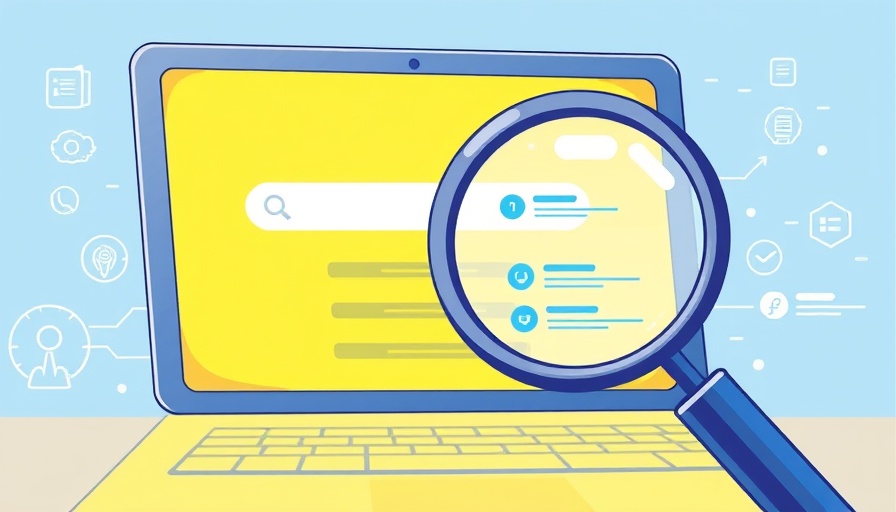
The AI Search Engine Landscape: A Comparison of Giants
As artificial intelligence continues to penetrate every sector, the search engine realm is no exception. Small business owners, marketers, and agencies, all keenly understand the significant impact of AI-driven search tools on their strategies. Recently, several AI search engines have sprung up, providing answers to queries in ways that traditional engines like Google and Bing have not. Let’s dive into how these platforms—ChatGPT, Perplexity, Google, and Bing—stack up against one another.
Understanding the Players: ChatGPT and Perplexity
ChatGPT, known for its conversational capabilities, presents itself as a robust tool for generating detailed responses based on prompts. Its ability to engage in dialogue around multiple topics makes it appealing for those requiring nuanced information. It also allows for follow-up questions, creating a dynamic conversation around user interests.
On the other hand, Perplexity is engineered to provide concise answers quickly while sourcing information from various credible sites. Perplexity emphasizes fact-checking and precision, catering to users who need quick, accurate data without the lengthy interactions seen in ChatGPT.
Google and Bing: Stalwarts of Search
Google has long been the undisputed champion of search engines, known for its vast reach and ability to provide a plethora of resources at users’ fingertips. It employs powerful algorithms that continuously adapt, ensuring users experience refined results over time.
Bing, while often overshadowed, has been making inroads by enhancing its AI capabilities. It has begun integrating features akin to those of ChatGPT, such as conversational queries and AI-generated recommendations, aiming to carve out its niche in the competitive landscape.
Comparative Analysis and Use Cases
As small business owners and marketers, it’s crucial to understand the strengths of each AI search engine. For instance, if you're crafting content that requires depth and engagement, ChatGPT could assist tremendously in generating innovative ideas and narratives.
Conversely, if efficiency and speed are more critical, especially for immediate data retrieval, Perplexity might be your go-to tool. Marketers can benefit from its straightforward answers during rapid analysis or when prepping presentations.
Furthermore, when utilizing Google or Bing, business owners should leverage their extensive analytics capabilities. Both engines offer tools that facilitate keyword tracking and SEO strategy optimization, essential for maintaining a competitive edge in today's digital marketplace.
Risk Factors and Challenges in AI Search
While these AI-powered tools present incredible opportunities, they also come with unique challenges. For instance, reliance on conversational AI like ChatGPT may lead to overfitting in content creation, where answers become overly tailored to specific prompts without capturing the broader context of the user’s needs.
Additionally, as the algorithms of AI search engines evolve, the reliability of information must be critically assessed. Small businesses must prioritize verifying the integrity of sources generated by AI tools to ensure effective communication and informed decision-making.
Emotional Dynamics: The Human Element of Marketing
Today’s marketing heavily relies on understanding human emotions and relationships. As these AI technologies proliferate, businesses must remember that the most engaging marketing strategies resonate on a personal level. AI can analyze data and trends efficiently, but the human touch is irreplaceable when it comes to building lasting connections.
For instance, if a small business owner utilizes AI to generate marketing content but fails to inject their brand’s personality, they risk losing their unique voice. True brand loyalty cannot solely be built on algorithms; it requires authenticity and genuine engagement with consumers.
Looking Ahead: Future Trends in AI Search
The future of AI search engines seems geared towards greater personalization and integration of user-generated data. As more consumers feel the pressure for rapid responses, AI search tools must evolve to cater to this demand without sacrificing the depth and quality of information.
Moreover, innovations like integrating visual search capabilities and enhancing multilingual support could further expand the user base, allowing them to interact with these platforms more naturally and intuitively. Expect more collaborative features where users can train these AIs based on feedback to create even more tailored experiences.
Conclusion: Embracing AI in Marketing Strategies
It's clear that AI search engines like ChatGPT, Perplexity, Google, and Bing present unique avenues for marketers, small business owners, and agencies to optimize their strategies. Each offers varying strengths from conversational interaction to concise data retrieval.
If you want to stay ahead in your digital marketing efforts, understanding these platforms and knowing when to utilize them will significantly enhance your effectiveness. Don't just adapt—embrace these tools as essential allies in your quest for comprehensive online marketing success!
As AI continues to evolve, consider how you can weave these tools into your marketing strategies. Explore and implement innovative approaches today, and watch your business thrive in an increasingly competitive landscape.
 Add Row
Add Row  Add
Add 




Write A Comment